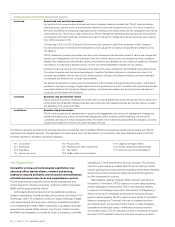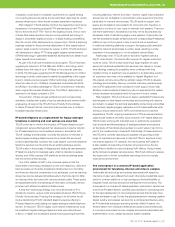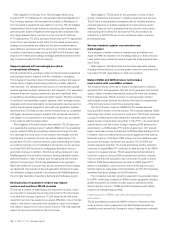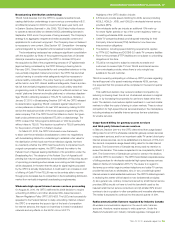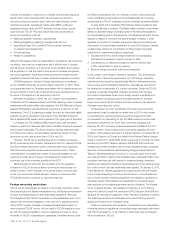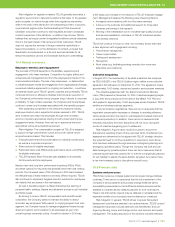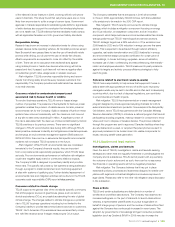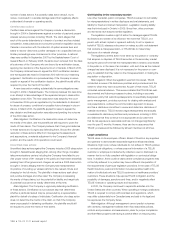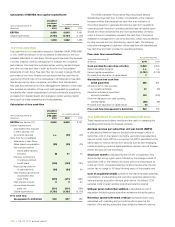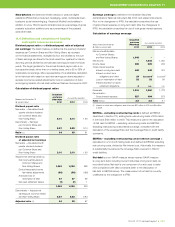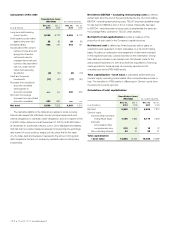Telus 2010 Annual Report Download - page 106
Download and view the complete annual report
Please find page 106 of the 2010 Telus annual report below. You can navigate through the pages in the report by either clicking on the pages listed below, or by using the keyword search tool below to find specific information within the annual report.102 . TELUS 2010 annual report
Foreign operations
Maintaining TELUS’ international operations presents unique risks,
including country-specific risks (such as different political, legal and
regulatory regimes and cultural values), lack of diversity in geographical
locations, concentration of customers, different taxation regimes, infra-
structure and security challenges, different exposure to and frequency
of natural disasters, and the requirement for system processes that work
across multiple time zones, cultures and countries. There can be no
assurance that international initiatives and risk mitigation efforts will provide
the benefits and efficiencies expected, or that there will not be significant
difficulties in combining the different management and cultures, which
could result in a negative impact on operating and financial results.
Risk mitigation: TELUS’ strategy is to improve the diversity and geo-
graphic distribution of its operations, customers and conduct of business
process outsourcing activities. TELUS has in recent years expanded
its Philippines operations to locations in India, Central America, the
Caribbean region and the U.S. state of Nevada. The continued expansion
of international operations provides TELUS with more geographic diver-
sity, spreads political risk among the foreign jurisdictions, provides the
Company an ability to serve customers in multiple languages and in
multiple time zones, and through network redundancy and contingency
planning, provides the ability to divert operations in emergency situations.
The Company continues to work with its international operations to
extend operational best practices, to integrate and align international
and domestic Canadian operations, as appropriate, and to ensure that
internal controls are implemented, tested, monitored and maintained.
TELUS also maintains a currency hedging program to reduce certain
foreign currency exposures.
Integration of acquisitions
Post-merger and post-acquisition activities include the review and
alignment of accounting policies, employee transfers and moves,
information systems integration, optimization of service offerings and
establishment of control over new operations. Such activities may not
be conducted efficiently and effectively, negatively impacting service
levels, competitive position and expected financial results.
Risk mitigation: TELUS has a team that performs a post-merger
integration (PMI) function. The PMI team applies an integration model,
based on learnings from numerous previous post-acquisition integrations,
which enhances and accelerates the standardization of TELUS’ busi-
ness processes and strives to preserve the unique qualities of acquired
operations. PMI begins with strategic, pre-closing analysis and planning,
and continues after closing with the execution of a plan. Initial plans are
re-evaluated and assessed regularly, based on timely feedback received
from the integration teams.
Data protection
Some of the Company’s efficiency initiatives rely on offshoring of internal
functions to TELUS International’s operations and leveraging partners
domestically and abroad. To be effective, offshore and partner relation-
ships require TELUS to provide access to the Company’s data. Remote
access to TELUS data could lead to data being lost, compromised or
accessed by third parties potentially for inappropriate use, negatively
impacting the Company’s competitive position, financial results and brand.
Risk mitigation: A core component of TELUS’ strategy is for data to
reside in TELUS facilities in Canada, with the deployment of infrastructure
to support partner connectivity to view these TELUS systems. TELUS
International and partners are provided with remote views of the data
without it being stored on local systems.
functional, performance and revenue assurance testing, as well as
capturing and utilizing lessons learned. In addition, TELUS often moves
its business continuity planning and emergency management operations
centre to a heightened state of readiness in advance of major systems
conversions.
Large enterprise deals
TELUS’ operating efficiency and earnings may be negatively impacted
by challenges with (or ineffective) implementation of large enterprise
deals, which may be characterized by service credits that lower revenues,
significant upfront expenses and capital expenditures, and a need to
anticipate, understand and respond to complex and multi-faceted
enterprise customer-specific requirements and stakeholders. There can
be no assurance that service implementation will proceed as planned
and expected efficiencies will be achieved, which may impact return on
investment or desired margins to be realized. The Company may also
be constrained by available staff, system resources and co-operation of
existing service providers, which may limit the number of large contracts
that can be implemented concurrently in a given period and/or increase
the cost to TELUS related to such implementations.
Risk mitigation: TELUS has gained experience in implementing
numerous large enterprise deals over a number of years and expects
to continue to focus on implementing recent large enterprise contract
wins. In addition, the Company expects to continue being selective
as to which new large contracts it will bid on and to increase its focus
on the SMB market.
TELUS continues to realize the benefits of implementing internal
reorganizations, including the consolidation of three enabling units into
two integrated teams: Technology Strategy and Business Transformation
and Technology Operations, as well as the consolidation of certain
customer-facing business units. The expected benefits include stream-
lined operations, more effective deployment of technologies and
supporting systems, cost efficiencies, improved customer service, and
better capability to implement large enterprise deals. TELUS follows
industry standard practices for rigorous project management, including
executive (senior) level governance and project oversight; appropriate
project resources, tools and supporting processes; and proactive
project-specific risk assessments and risk mitigation planning. TELUS
also conducts independent project reviews and internal audits to help
monitor progress and identify areas that may require additional focus,
and to identify systemic issues and learnings in project implementations
which may be shared among projects.
Reorganizations
Arising from its operating efficiency program, the Company carries
out a number of operational consolidation, rationalization and integration
initiatives each year. For 2010 initiatives, see Section 2.2 Strategic
imperatives – Investing in internal capabilities. The initiatives are aimed
at improving the Company’s operating productivity and competitiveness.
There can be no assurance that all planned efficiency initiatives will
be completed, or that such initiatives will provide the expected benefits
or will not have a negative impact on operating performance, employee
engagement, financial results and customer service.
Risk mitigation: TELUS focuses on and manages organizational
changes through a formalized business transformation function by
leveraging the expertise, key learnings and best practices gained from
mergers, business integrations and efficiency-related reorganizations
in recent years.


